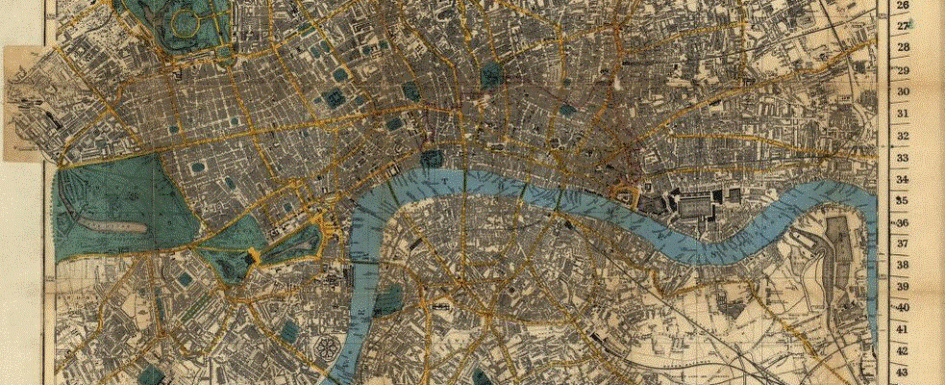
Jo Guldi’s first book, Roads to Power: Britain Invents the Infrastructure State, argues that Britain became an “infrastructure state” during the eighteenth and nineteenth centuries, a period which saw an explosion in construction of roads, along with the accompanying surveying, management, and surveillance of that construction. Guldi’s work often deals with infrastructure, and when she turns her attention away from the history of the British Empire to the digital humanities, infrastructure is at the forefront of her mind there, too.
Guldi spoke at the University of Pittsburgh’s Mellon Sawyer Seminar, Information Ecosystems, on Jan. 9 and 10. She also sat down with me for an interview that is part of the podcast series, Information Ecosystems, and will be published soon. As professor of history at Southern Methodist University, Guldi teaches history classes with a few glimpses of the digital humanities, and runs the Guldi Lab, where she employs distant reading techniques to better understand historic texts.
While interviewing Guldi and hearing her speak, I was struck by the way the concept of infrastructure — be it the analog infrastructure of roads and canals or the digital infrastructure underlying the Internet — recurs in her work and her thinking. She told me during the podcast interview that she considers it important that her scholarship be available online in open-access form. Many of her articles are open-access, as is her second book, The History Manifesto, co-authored with David Armitage.
Like the miles and miles of roads that connected Britain in the nineteenth century, the Internet has the power to connect people and ideas. That connection is all the easier if information is available not behind a paywall but to anyone who wants it.
In her scholarship, too, she hopes to make transportation easier for researchers of different disciplines. Disciplinary boundaries may seem a little alien to Guldi, who learned how to code at age ten, then put that aside when she discovered the rigor of the humanities. She studied ancient languages and critical theory for a time, before returning to the computational methods. She expressed some bemusement at a deep disciplinary rift when I asked her to comment on the differences between the disciplines.
“I find myself in a realm where disciplinarity seems, in a sense, quaintly old-fashioned,” she told me in the interview.
Guldi demonstrates that in her own work. In this 2018 article published in Journal of Cultural Analytics, Guldi argues for a method she calls “critical search,” which involves using multiple, carefully chosen computational techniques, along with contextual understanding of the textual object, to interpret the object. Guldi “proposes that the solution for better text-mining is not another algorithm, but a new attitude among scholars engaging with digital techniques.” Part of the critical search process is employing computational methods, such as topic models, to be sure. But another part is “guided reading” of texts, which involves “reading and interpreting them with the skills of a traditional researcher.”
Guldi demonstrates these strategies with a 2019 article published in the journal Technology and Culture, in which she employs dynamic topic modeling to look for change over time in parliamentary debates about infrastructure. While Guldi is quick to point out she is not a historian of Britain’s Parliament, she can apply her immense knowledge of Britain’s infrastructural history to the results of the topic models.
Guldi’s ideas about critical search gives the lie to the idea that computational methods and the humanities exist in a binary, possibly adversarial relationship. Rather, careful methods from both disciplines should be employed at appropriate times during the research process.
Digital humanists, Guldi told me, often move between departments and disciplines, working with other scholars with similar interests but different skills. Sometimes interdisciplinarity eventually engenders new disciplines, or “new island[s],” but that isn’t necessary.

“The digital humanities works slightly differently, I think, where rather than be an island, there are these travelers that have gone out into” other disciplines “with their digital humanities rucksack of tools on their backs and they talk to whoever is there,” she explained.
Such peregrinations are necessary. A humanist likely doesn’t have the coding skills needed to do a complicated computational project, nor does a coder have the nuanced understanding of history to interpret the results of dynamic topic models.
Digital humanists, rucksacks on backs, will continue to hike from department to department. Hopefully, soon, the roads they walk on those hikes will be wide, smooth and fully maintained.
Briana Wipf is a PhD student in the English Department at the University of Pittsburgh, where she studies medieval literature and digital humanities. She previously blogged about Dr. Matthew Edney’s work with maps and his visit to the Information Ecosystems Sawyer Seminar here.
